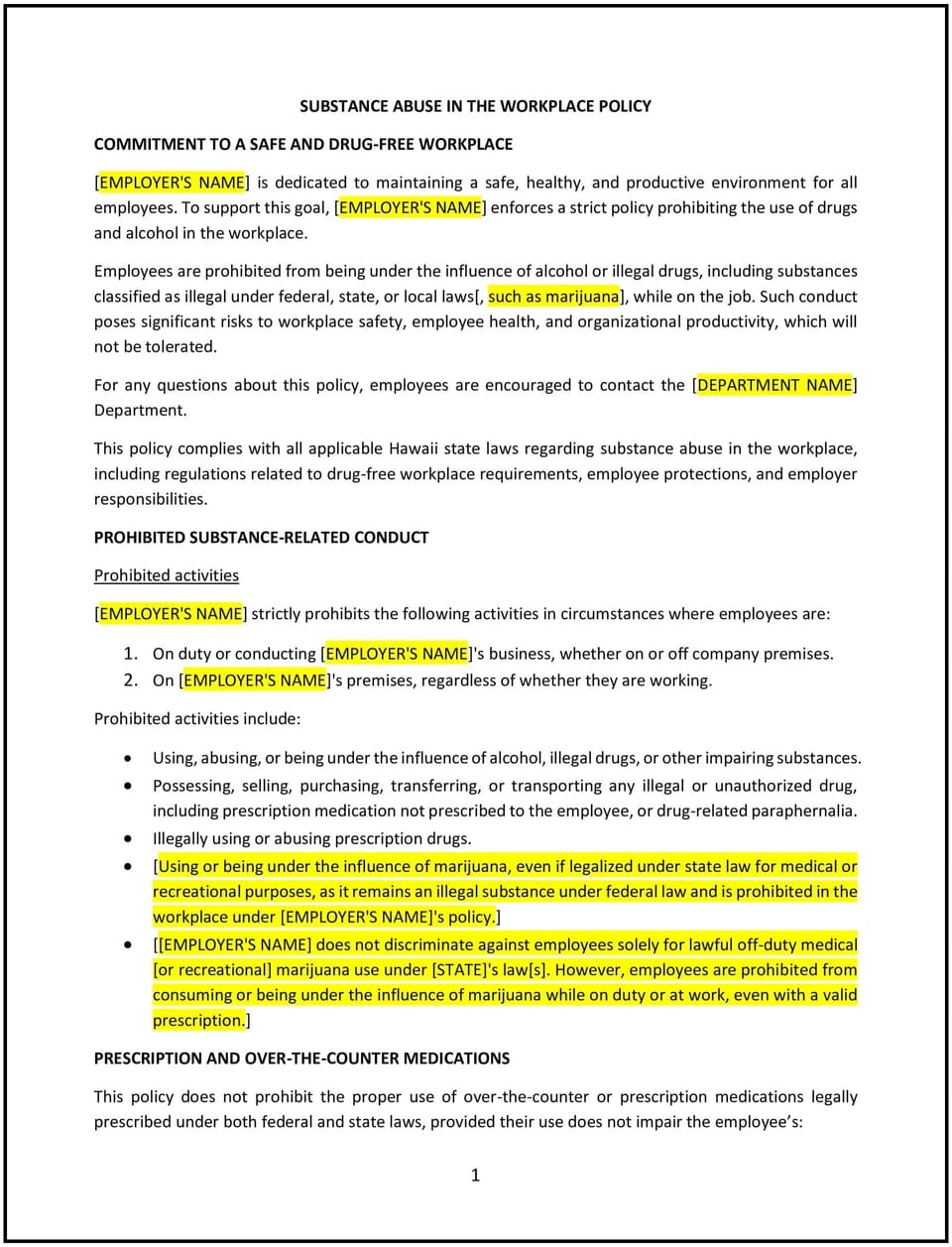Substance abuse in the workplace policy (Hawaiʻi): Free template

Substance abuse in the workplace policy (Hawaiʻi)
A substance abuse in the workplace policy helps Hawaiʻi businesses address the risks associated with alcohol, drugs, and other substances in the workplace. This policy outlines guidelines for identifying, preventing, and managing substance abuse issues, while considering Hawaiʻi’s unique cultural and legal context. It is designed to promote a safe, healthy, and productive work environment for all employees.
By implementing this policy, businesses in Hawaiʻi can reduce safety risks, support employee well-being, and maintain a professional workplace culture.
How to use this substance abuse in the workplace policy (Hawaiʻi)
- Define substance abuse: Clearly explain what constitutes substance abuse, including the misuse of alcohol, illegal drugs, prescription medications, and other substances.
- Prohibit substance abuse: Specify that the use, possession, or distribution of illegal substances is prohibited on business premises or during work hours.
- Address prescription medications: Provide guidelines for employees using prescription medications that may impair their ability to perform job duties safely.
- Establish testing procedures (if applicable): Outline the circumstances under which drug or alcohol testing may be conducted, such as post-accident or reasonable suspicion scenarios.
- Provide support resources: Offer information about employee assistance programs (EAPs) or local resources for substance abuse treatment and recovery.
- Communicate the policy: Share the policy with employees during onboarding and through internal communications to ensure awareness and understanding.
- Train managers and staff: Educate managers and employees on the policy’s guidelines, including how to recognize signs of substance abuse and respond appropriately.
- Monitor and enforce the policy: Regularly review workplace behavior and address any issues promptly and fairly.
- Review and update the policy: Periodically assess the policy’s effectiveness and make adjustments as needed to reflect changes in laws or business needs.
Benefits of using this substance abuse in the workplace policy (Hawaiʻi)
This policy offers several advantages for Hawaiʻi businesses:
- Promotes safety: A clear policy reduces the risk of accidents, injuries, and other safety hazards caused by substance abuse.
- Supports employee well-being: Providing resources for treatment and recovery demonstrates the business’s commitment to employee health.
- Maintains productivity: Addressing substance abuse helps ensure employees are focused, alert, and able to perform their duties effectively.
- Reduces liability: Proactive measures to prevent substance abuse can minimize legal and financial risks for the business.
- Builds trust: A fair and supportive approach to addressing substance abuse fosters trust between employees and management.
- Enhances workplace culture: A policy that prioritizes safety and well-being contributes to a positive and professional work environment.
- Aligns with community values: Hawaiʻi’s emphasis on health and wellness is reflected in a policy that addresses substance abuse constructively.
Tips for using this substance abuse in the workplace policy (Hawaiʻi)
- Communicate the policy effectively: Share the policy with employees during onboarding and through regular reminders, such as emails or training sessions.
- Provide training: Educate managers and employees on the policy’s guidelines, including how to recognize signs of substance abuse and respond appropriately.
- Offer support: Provide information about employee assistance programs (EAPs) or local resources for substance abuse treatment and recovery.
- Be consistent: Apply the policy consistently to all employees to ensure fairness and transparency.
- Address issues promptly: Take immediate action to address substance abuse concerns, ensuring the safety and well-being of all employees.
- Review the policy periodically: Update the policy as needed to reflect changes in laws, workplace dynamics, or business needs.
Q: Why should Hawaiʻi businesses adopt a substance abuse in the workplace policy?
A: Businesses should adopt this policy to promote safety, support employee well-being, and maintain a productive and professional work environment.
Q: What substances are covered under the policy?
A: The policy should address alcohol, illegal drugs, prescription medications, and other substances that may impair an employee’s ability to work safely.
Q: Can businesses conduct drug or alcohol testing?
A: Businesses may conduct testing under specific circumstances, such as post-accident or reasonable suspicion scenarios, but should follow legal guidelines and communicate procedures clearly.
Q: How should businesses handle employees using prescription medications?
A: Businesses should provide guidelines for employees using prescription medications that may impair their ability to work safely, such as requiring medical documentation or temporary role adjustments.
Q: What resources should businesses offer to employees struggling with substance abuse?
A: Businesses should provide information about employee assistance programs (EAPs), local treatment centers, or other resources for substance abuse recovery.
Q: How should managers recognize signs of substance abuse?
A: Managers should be trained to recognize signs such as changes in behavior, performance, or attendance, and respond with empathy and professionalism.
Q: What should businesses do if an employee violates the policy?
A: Businesses should address violations promptly and fairly, using a consistent approach that includes education, corrective action, and support for recovery.
Q: How often should businesses review the policy?
A: Businesses should review the policy annually or as needed to reflect changes in laws, workplace dynamics, or business needs.
This article contains general legal information and does not contain legal advice. Cobrief is not a law firm or a substitute for an attorney or law firm. The law is complex and changes often. For legal advice, please ask a lawyer.


